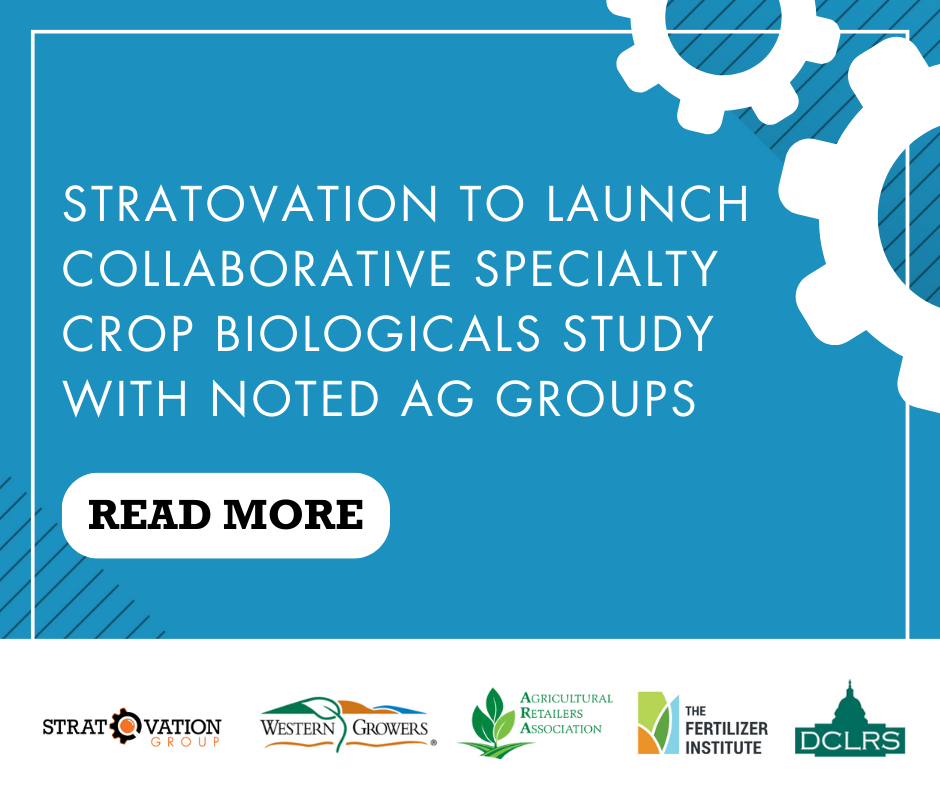Stratovation to Launch Collaborative Specialty Crop Biologicals Study with Noted Ag Groups
SALINAS, Calif., Sept. 20, 2023 — Stratovation Group, fresh off releasing landmark research about the sentiments of traditional row-crop farmers on the use of agricultural biologicals, is engineering a new study to look at how specialty-crop growers perceive agricultural biologicals for vegetable, leafy greens and fruit and nut crops.
The new study, ″Biologicals: Specialty Crop Growers’ Perceptions, Values and Potential,” will be conducted in collaboration with Western Growers (WG), the Agricultural Retailers Association (ARA), DC Legislative and Regulatory Services (DCLRS), and The Fertilizer Institute (TFI).
“Partnering with these exceptional organizations for this specialty crop effort is really a testament to the findings farmers shared with us during our row-crop biologicals study,” said Cam Camfield, Founder and CEO at Stratovation Group. “We are excited because more thoughtful input from a variety of players at the front end will help us get better data throughout the study. And better data will drive better planning and results for every organization involved, and ultimately for the growers.″
Like the first study, the specialty crop effort will be a comprehensive market research effort focused on understanding farmer/grower opinions on the current use, issues and potential for biologicals, but specifically for vegetable, leafy greens and fruit and nut production at the farm level.
“Our Salinas Biological Summit reinforced the increasing role of biological products in our member’s future production efforts,” said Western Growers Innovation Center Director Dennis Donohue. “We are pleased to see this type of study for specialty crops.”
Corey Rosenbusch, President and CEO of TFI, expressed the importance of agribusiness input suppliers having access to the kind of essential information that will result from the specialty crops study.
“Like all the other sponsor partners joining this study, TFI recognizes the importance of understanding how our growers are using agricultural biologicals,” Rosenbusch said. “Like the earlier row-crop study, this effort provides a unique opportunity to gather insights directly from growers, enabling our members to support their input needs effectively and drive sustainable innovation deeper into agriculture.”
The study also will be undertaken with support and ongoing strategic counsel from renowned biologicals specialist Dr. Pam Marrone.
“When it comes to the development, marketing and effectiveness of agricultural biologicals, Dr. Marrone is unmatched,” said Jay Vroom of DCLRS. “Moreover, the row-crop study conducted by Stratovation Group opened a lot of eyes about biologicals on the farm, and I envision this study will do exactly the same in the specialty crop sector.”
According to Daren Coppock, President and CEO of ARA, the growing role that agricultural biologicals are playing in the production strategies of farmers and growers has been a hot topic among ag companies.
“Agricultural biologicals have become an indispensable component of grower strategies,” Coppock said. “We suspect that is even more true in the specialty and fruit and vegetable sector, but this study will put that idea to the test.”
Biologicals offer innovative solutions and in some cases alternatives to traditional pesticides and fertilizers, enabling growers to enhance crop health while minimizing environmental impact. The study will shed light on the perceptions and experiences of growers, providing valuable insights into how agricultural biologicals are driving sustainability and shaping the future of farming, according to Stratovation Group’s Camfield.
″Biologicals: Specialty Crop Growers’ Perceptions, Values and Potential″ is set to kick off this year and occur annually. This 2023 study will set benchmarks for adoption and attitudes around the use of biologicals by specialty crop growers and provide a roadmap to those companies seeking to grow and develop the market category.
While there are other reports that may help in broad trend analysis, Camfield said, they lack the voice of the specialty crop grower, explained Camfield.
″In contrast, this will be a grower-centric study,” he said. “And it’s time for the market to listen to them more – seek to understand the good, and work to improve any weaknesses perceived at the grower level.″
Camfield stressed that those interested in joining the effort to produce the ″Biologicals: Specialty Crop Growers’ Perceptions, Values and Potential″ annual research report can become a sponsoring partner and share in all the findings. Reports from the earlier Row-Crop Study are also available. For more information, contact Camfield at [email protected].

